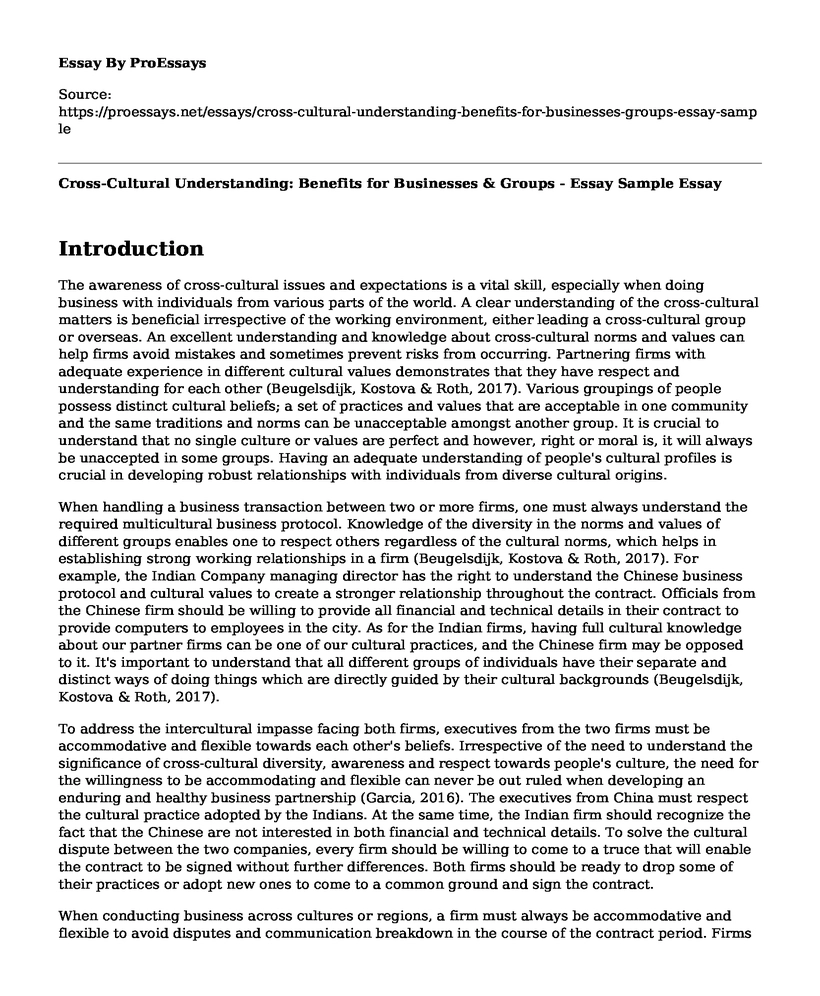Introduction
The awareness of cross-cultural issues and expectations is a vital skill, especially when doing business with individuals from various parts of the world. A clear understanding of the cross-cultural matters is beneficial irrespective of the working environment, either leading a cross-cultural group or overseas. An excellent understanding and knowledge about cross-cultural norms and values can help firms avoid mistakes and sometimes prevent risks from occurring. Partnering firms with adequate experience in different cultural values demonstrates that they have respect and understanding for each other (Beugelsdijk, Kostova & Roth, 2017). Various groupings of people possess distinct cultural beliefs; a set of practices and values that are acceptable in one community and the same traditions and norms can be unacceptable amongst another group. It is crucial to understand that no single culture or values are perfect and however, right or moral is, it will always be unaccepted in some groups. Having an adequate understanding of people's cultural profiles is crucial in developing robust relationships with individuals from diverse cultural origins.
When handling a business transaction between two or more firms, one must always understand the required multicultural business protocol. Knowledge of the diversity in the norms and values of different groups enables one to respect others regardless of the cultural norms, which helps in establishing strong working relationships in a firm (Beugelsdijk, Kostova & Roth, 2017). For example, the Indian Company managing director has the right to understand the Chinese business protocol and cultural values to create a stronger relationship throughout the contract. Officials from the Chinese firm should be willing to provide all financial and technical details in their contract to provide computers to employees in the city. As for the Indian firms, having full cultural knowledge about our partner firms can be one of our cultural practices, and the Chinese firm may be opposed to it. It's important to understand that all different groups of individuals have their separate and distinct ways of doing things which are directly guided by their cultural backgrounds (Beugelsdijk, Kostova & Roth, 2017).
To address the intercultural impasse facing both firms, executives from the two firms must be accommodative and flexible towards each other's beliefs. Irrespective of the need to understand the significance of cross-cultural diversity, awareness and respect towards people's culture, the need for the willingness to be accommodating and flexible can never be out ruled when developing an enduring and healthy business partnership (Garcia, 2016). The executives from China must respect the cultural practice adopted by the Indians. At the same time, the Indian firm should recognize the fact that the Chinese are not interested in both financial and technical details. To solve the cultural dispute between the two companies, every firm should be willing to come to a truce that will enable the contract to be signed without further differences. Both firms should be ready to drop some of their practices or adopt new ones to come to a common ground and sign the contract.
When conducting business across cultures or regions, a firm must always be accommodative and flexible to avoid disputes and communication breakdown in the course of the contract period. Firms partnering with their oversea colleagues should understand that cultural monopoly does not exist, and every business entity is entitled to practice their distinct cultural practices (Garcia, 2016). In our case, Chinese officials should be accommodative and be willing to provide their technical and financial details. The Indian company should also be prepared to compromise their partners' cultural background to break the impasse and percent communication breakdown.
References
Beugelsdijk, S., Kostova, T., & Roth, K. (2017). An overview of Hofstede-inspired country-level culture research in international business since 2006. Journal of International Business Studies, 48(1), 30-47. https://link.springer.com/article/10.1057/s41267-016-0038-8
Garcia, G. (2016). Japanese Cultural Traditions and International Business. In International Business: Concepts, Methodologies, Tools, and Applications (pp. 1254-1274). IGI Global.
https://www.researchgate.net/profile/Bryan_Christiansen3/publication/272484558_Nationalism_Cultural_Indoctrination_and_Economic_Prosperity_in_the_Digital_Age/links/54e5aa190cf276cec17472f2/Nationalism-Cultural-Indoctrination-and-Economic-Prosperity-in-the-Digital-Age.pdf#page=127
Cite this page
Cross-Cultural Understanding: Benefits for Businesses & Groups - Essay Sample. (2023, May 18). Retrieved from https://proessays.net/essays/cross-cultural-understanding-benefits-for-businesses-groups-essay-sample
If you are the original author of this essay and no longer wish to have it published on the ProEssays website, please click below to request its removal:
- Marketing Strategy of Health Cafe
- Problem Solving Using Fishbone Diagram: French Restaurant in New York City
- Gender and Family Structure Essay
- Essay Sample on Marriott Courtyard
- Cultural Diversity: Benefits of Inclusion at LaSalle Chemicals Corp - Essay Sample
- Essay Example on Grow Business with GYB & DYB: Augmenting Business Sustainability
- Campaigning for History: Evaluating the D-Day Story Museum's Public Relations Efforts - Paper Example







